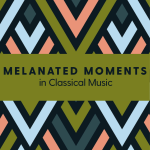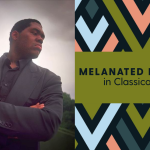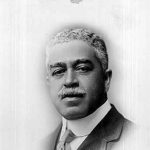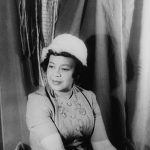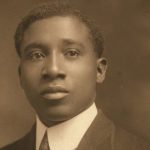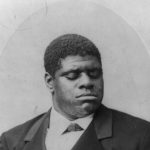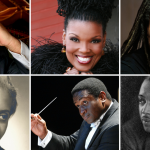MMCM S3E5: Samuel Coleridge-Taylor – The Song of Hiawatha
Joshua and Angela expound on the life and work of the iconic British composer Samuel Coleridge-Taylor, focusing on one of his most famous works, the Song of Hiawatha. Excerpts from the Hiawatha Overture punctuate the discussion of Coleridge Taylor’s international career, prolific body of work, and how composers of that era often did not receive fair financial compensation for their work.
Featured Music:
“Hiawatha Overture,” by Samuel Coleridge-Taylor, performed by the RTÉ Concert Orchestra and conducted by Adrian Leaper
Joshua Thompson (00:00): Before we get started with this episode, we wanted to thank everyone for your amazing support of this podcast. As our podcast community grows, we have added resources for each episode. So just visit our website to access blog posts and transcripts for each episode or follow us on social media and email us anytime with your podcast suggestions to melanatedmoments@classicalmusicindy.org. Music Plays (00:34): [MMCM Theme] Joshua Thompson (00:43): Hello everyone. And welcome back for another riveting episode of Melanated Moments in Classical Music. I’m Joshua Thompson. Angela Brown (00:52): I’m Angela Brown. Joshua, I already know you’ve got a feature today that will brilliantly combine epic musical composition with fascinating history and biographical stuff ‘n’ thangs. Who and what do you have to offer our listening public today? Joshua Thompson (01:11): Well, Angela, you know me so well. And you’re right! Today, I humbly submit a piece of music that is truly a time-tested masterwork written by a gentleman whose story and history is nothing short of epic and noteworthy. So, are you ready for it? Angela Brown (01:29): Child you know I was born ready. So let’s come on quick! Who is on deck today? Joshua Thompson (01:34): Well steady on the ready. We’ve got the British phenom, Samuel Coleridge-Taylor, and his stunning trilogy of a tone poem, Song of Hiawatha. Angela Brown (01:45): Yes, honey! You know I did a recording of that with the Longfellow Chorus! Joshua Thompson (01:49): So, I hear, okay! So now I got another one to get! Angela Brown (01:52): So, you have to check that out though. Joshua Thompson (01:54): I will! I got to get my auntie Angela in, and– oh, the whole thing! This guy is often called “The African Mahler” by his American contemporaries, and this man and this composition is so very much of his time. And honestly, if you read it this way, pretty relevant and current to our own 21st century. Angela Brown (02:15): I mean, I can already tell this episode is going to be another one of your Blerd-i-sphere, style episodes [laughter]. Joshua Thompson (02:24): You had your doubts! Please, girl, you know, this is what I do! But yes, uh, this guy has a life and a body of work that is so interdisciplinary, captivating, and just full of the stuff ‘n’ thangs that helps us understand the social -historical significance of the African diaspora at the turn of the 20th century. Angela Brown (02:47): Well, before you get too far ahead of us, can we share with our audience some biographical information on Maestro Taylor? Joshua Thompson (02:56): Of course. He was born in 1875, died in 1912 at the age of 37. Angela Brown (03:03): Mm! Too young. Joshua Thompson (03:04): I know we gon’ get to that. We gon’ get to it. His mother was English and his father was from Sierra Leone of the Creo People. Pull back, just a little bit, give a little explanation: Creo, or as we call it Creole– it’s a little different, but it’s based on, somewhat, the same thing– is an ethnic group in Sierra Leone. For those who don’t know, the country of Sierra Leone was founded and made by, uh, you know, people who are descendants of freed African-American, West Indian and liberated African slaves who settled in that area between like 1787 and 1885. And so, the British established this colony, it’s supported by abolitionists, and, um– so before we have our whole Marcus Garvey, back to Africa– there was already a “something” going on. So I just find that fascinating, there you go. Um, his mother comes from a very musical family and it was Taylor’s, uh, maternal grandfather who taught him how to play the violin. A little bit, you know– I don’t know relationships are tricky. And so, the weird thing about his dad is before his father even knew that he had sired a child, he was already back to Africa. So– Angela Brown (04:25): Well! Joshua Thompson (04:25): That’s a whole soap opera, we ain’t goin’ in– Angela Brown (04:27): — Papa was a rollin’ stole over the water! Joshua Thompson (04:27): — Well, somethin’, I don’t know! And so, so yes. So Samuel Coleridge Taylor becomes a young professional musician and is appointed a professor at The Crystal Palace School of Music and becomes a conductor with The Croydon, uh, conservatory, by age 20. This man is already earning a reputation as a wildly influential composer, as evidenced by his collaborations and tutelage under Edward Elgar. Right? So if we know Pomp and Circumstance and The Enigma Variations, this is who he studied with. Angela Brown (05:05): Okay! Joshua Thompson (05:07): He is best known for his 19, or I’m sorry, his 1898 masterpiece Hiawatha’s Feast, which debuted when he was only 22. Angela Brown (05:19): Wow, wow. Joshua Thompson (05:20): Angela, at 22, I was being goofy and reckless. I was not making an international name as a composer. So just to show you how magnificent this work was and still is in his lifetime–and honestly like, decades after– pretty much the only choral works that are being programmed more than his were Handel’s Messiah and Mendelssohn’s Elijah. So he up there, he up there. And so he meets a lot of prominent people throughout his short lifetime, like Paul Laurence Dunbar and W.E.B. Dubois. And he has several tours about three of them to the, uh, to the United States. And he’s very much working in the vein– even though, from across the pond– like Harry Burly, when it comes to integrating, you know, traditional folk and, uh, cultural influences into the classical genre. And so he’s one of the first Black people to be invited to the United States in 1904 by Teddy Roosevelt, wildly significant. Unfortunately at the age of 37, Taylor dies of pneumonia, and it’s pretty well attributed to the stress of a lifelong issue with financial troubles. We gon’ circle back to that, but his epitaph on his grave I think is really pretty touching. And it says, “Too young to die, his great simplicity, his happy courage in an alien world, his gentleness made all that knew him love him.” Angela Brown (06:52): Wow. I tell you…I’m just trying to wrap my head around all this. I mean, you’ve given us a very surface overview of this man’s life and you haven’t even listed off the long list of piano and chamber works of his. He reminds me of another feature we did in Season Two, Moses Hogan. Two luminaries, who contributed so much, but weren’t here in the flesh for very long. Joshua Thompson (07:20): Yeah, you’re right. And very much so, very much so. And I think that’s a fantastic season to season parallel that you’ve tapped into there, Angela. I tell you what, we’ll circle back to some of the other items that I’ve mentioned previously, but let’s get to the music. Angela Brown (07:37): That’s what we’re here for, right! Joshua Thompson (07:41): Okay, a little background: Samuel Coleridge-Taylor’s Hiawatha is a three part tone poem based on the poetic work of Longfellow. So Hiawatha is the main character in this and all of the characters are Native American, right? That’s what this whole thing is. So, think of this composition as: now, we know of like the Star Wars trilogy and the Lord of the Rings trilogy– Taylor’s doing this before they are. And so all three of these sets were written between 1898 and 1900. But before the set of the first one, you know, Hiawatha piece was written, he’d already been commissioned to write the subsequent follow-ups. Angela Brown (08:26): Wow. So, uh, this is pretty epic? Joshua Thompson (08:30): Without a doubt. So what we’ll hear today, isn’t actually the most popular of the set. As I said, that would be Hiawatha’s Wedding Feast. And then there’s The Death of Minnehaha, and the trilogy completes itself with Departure of Hiawatha. So yeah, so what we’re going to do is listen to, uh, what would be analogous to like the theme song for the entire piece, the Overture to Hiawatha, and it opens with this gorgeous shimmering and captivating like musical preview of what’s to come. And it’s just a delight to listen to it. Angela Brown (09:09): I mean, I loved recording this. So as per usual, you have done enough talkin’. Can we hear it now, boo? Joshua Thompson (09:19): Yes, I’ll be quiet and we can hear it now. Music Plays (10:29): [Hiawatha, Overture- Samuel Coleridge Taylor] Angela Brown (14:24): Oh my goodness. You know, Joshua, this is gorgeous. I mean, it played out like a movie score. I mean, it’s gorgeous and lush and just– yes, I love it. It reminds me of grand ballet scores or monster soundtracks from the golden era of Hollywood. Joshua Thompson (14:43): I mean, and it really does. And you know what, that’s, that’s kind of the point, right? Because obviously this is pretty Hollywood, but the concept of opulence and heavy decadent musical elements has always been a major part of the entertainment industry from century to century. And this one’s no exception to that. Angela Brown (15:02): So this work definitely solidifies Taylor as a major composer of his time and all time. But you mentioned earlier that he had lifelong money trouble. Joshua Thompson (15:15): Yeah– Angela Brown (15:17): What’s that all about? Joshua Thompson (15:17): –Well, you know, it’s, uh, it’s really not all that different than what we continue to hear from the music industry today, right. So let’s think about Taylor Swift, you know, The Beatles, Aretha Franklin, Prince– all artists, you know, among many, who’ve had that tough decision to quote- unquote, like “sign the deal” for that lump sum upfront, but without, you know, getting residuals or royalties or even, right, owning the rights to your own music. So, you know, composers were not handsomely paid– some, were not handsomely paid for their, for their music. And they often sold the rights to the works outright, just to make immediate income. And this caused them, like I said, to lose out on royalties earned by publishers, who had invested in the music, you know, through distribution and publication, right? So the popular Hiawatha’s Wedding Feast sold hundreds of thousands of copies, but Taylor sold the music outright for a sum of 15 guineas, which– today’s approximate exchange rate is about $2,000 bucks. Angela Brown (16:27): What?! Joshua Thompson (16:27): I know. So he does not benefit directly, or at all, really outside of his first, uh, you know, selling off of this piece. And so, when he finally learns to retain the rights of his music, that’s so far down the long, that he just always struggled financially because he did not have that assistance, guidance. Angela Brown (16:49): That person, that you go to– Joshua Thompson (16:52): Yeah, It’s the same thing that we see happening in the music industry today. Angela Brown (16:56): Yeah. You know, Joshua, you really came with a banger today. I mean, before we go, since you gave us a wonderful opening intro to Taylor’s Hiawatha Overture, can we hear the last little bit before we sign off? Joshua Thompson (17:12): You know, I think that is a wonderful way to wrap up this episode. So let’s give the folks what they want, that musical bookend that we’ve all been waiting for. Music Plays (17:49): [Hiawatha Overture- Samuel Coleridge Taylor] Angela Brown (19:08): You know, you’re fabulous. I mean, and this fabulous, nothing more to say about it other than I’m Angela Brown… Joshua Thompson (19:15): And I’m Joshua Thompson… Unison (19:16): And this has been Melanated Moments in Classical Music. Angela Brown (19:27): Melanated Moments in Classical Music is a production of Classical Music Indy. Our producer is Ezra Bakker. Trupiano. Season Three production assistants are Okara Imani and Samantha Hoyer. Our theme music was composed by Laura Karpman. Joshua Thompson (19:45): Season Three of Melanated Moments in Classical Music was made possible in part by Jim and Sarah Lootens. We thank them for their generous support. Angela Brown (19:55): As a fan of this award-winning podcast, we need your help today to create future episodes. You can make Season Four a reality by texting “MMCM” to 202-8581-233. Your support includes exclusive content, playlists, and other perks to thank you for helping us share the stories of even more exceptional Black artists on the podcast. Our podcast educational partner is Morning Brown Incorporated. Joshua Thompson (20:30): And finally, if you’d like to join us in the celebration of the Black experience in the world of podcasting, check out our friends at The Black Podcasting Awards website.
[/su_tab] [su_tab title=”Related Blog Posts” disabled=”no” anchor=”” url=”” target=”blank” class=””]LOCAL CLASSICAL – MELANATED MOMENTS SEASON SIX
As we continue celebrating Black Music Month, this week’s playlist will feature music and artists discussed during the latest season of Melanated Moments in Classical Music. All of season six was recently released and featured vibrant discussions about artists such as Scott Joplin, Hazel Scott, Joseph Bologne, and Kenneth Overton, among others.
NEW CLASSICAL – ISATA KANNEH-MASON
In this week’s playlist, we feature British pianist, Isata Kanneh-Mason. She is the recipient of the 2021 Leonard Bernstein Award, a 2020 Opus Klassik award for best young artist and, as a member of the Kanneh-Mason family, the 2021 best classical artist at the Global Awards.
LOCAL CLASSICAL – BLACK MUSIC MONTH
In this week’s playlist, we celebrate Black Music Month which takes place in June. It was created by President Jimmy Carter in 1979 to honor and celebrate Black artists’ contributions to music. We’ll be honoring the late Herman Whitfield III, an Indianapolis native who was a gifted pianist and composer. We’ll also hear performances of artists who have been featured in season four of Classical Music Indy’s podcast, Melanated Moments in Classical Music.
LOCAL CLASSICAL – MELANATED MOMENTS
In this week’s Black History Month playlist, we bring you recordings by composers, performers, and artists who have been highlighted in our podcast, Melanated Moments in Classical Music. Melanated Moments is the ward-winning podcast from Classical Music Indy that shines a spotlight on musical works composed by, for, and about Black people.
LOCAL CLASSICAL – HOST OKARA IMANI
Hey, Starshine! This is Okara Imani, Media Production Fellow for Classical Music Indy, and your guide to The “I” in Classical Music. I’m here to highlight the cultural and social intersections of the classical art form, beyond the Classical Period and beyond the constructs of Euro-centric high society origins.
Ric’key Pageot: Inspiring a Moment to Learn, Acknowledge, and Respect
Ric’key Pageot: Inspiring a Mo …
LOCAL CLASSICAL – MARK ORTWEIN
In this week’s Local Classical channel, we’ll be highlighting local Indianapolis musician, Mark Ortwein. Mark is a bassoonist with the Indianapolis Symphony Orchestra, but his talents don’t stop at bassoon since he is also a sought-after instrumental doubler. Over the last 20 years, Mark has performed in many different musical projects including professional recordings, musical theater, chamber ensembles, jazz, and R&B groups, as well as many orchestral performances, including being a member of the Saxophone section for the Cincinnati Pops under Erich Kunzel.
Ignatius Sancho: Composing the Hypocrisy of Colonialism & Convention
Ignatius Sancho: Composing the …
NEW CLASSICAL – DR. BILL BANFIELD
This week we bring you the music of Dr. Bill Banfield. Dr. Banfield is an award-winning composer whose symphonies, operas, chamber works have been performed and recorded by major symphonies across the country. Few have a wider, performed professional composing output, that has had public concert performances, reviews, radio, recordings of some 12 symphonies, 7 opera, 9 concerti, chamber, jazz, and popular forms. This alone making Dr. Banfield one of the most performed, recorded composers of his generation. In 2010 and 2016, Dr. Banfield served as a Pulitzer Prize judge in American music.
Local Classical – Classical Pairings
To celebrate the release of Classical Pairings Season Two, we will be streaming a collection of works by the many artists that were featured throughout our weekly host challenges.
#AmplifyMelanatedVoices
Classical Music Indy stands with our Black community. We are here to listen, learn, and lend our support. We believe that classical music is powerful; that it evokes a range of human emotions and creative expression.
Angela Brown Brings her Unbridled Zeal to a New Podcast.
Angela Brown brings her unbrid …
Local Classical – Angela Brown
We continue our Black History Month programming this week with our featured artist, soprano Angela Brown. Born in Indianapolis, Brown has led a world-renowned career as a vocal soloist. Her highly successful Metropolitan Opera debut in the title role of Aida captured instant attention from international print and broadcast media and catapulted Angela onto the world’s prestigious opera and symphonic stages.
Spring Has Sprung! Playlist
Spring has finally arrived after the cold winter! Enjoy this playlist of springtime classical music. This playlist has classics like Vivaldi’s Four Seasons, and hidden gems like D’un matin de printemps by Lili Boulanger.
Highlighting our Female Performers
Classical Music Indy employs a diverse range of musicians for our events around Indianapolis. In 2016 we hired 95 musicians. Classical Music Indy has dedicated our blog articles to outstanding women musicians this month. We’ve shared about great women music educators in America and about under-recognized women musicians throughout history. This week, we take a look at a few of Classical Music Indy’s top performers – women who are doing great work here and now in the city of Indianapolis. Read below about these incredibly talented musicians, and hopefully you’ll hear them at one of our events in the near future!



